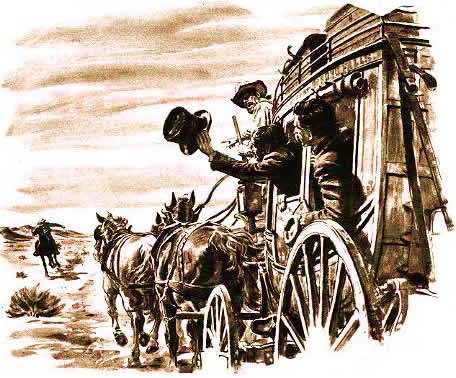|

Illustration
by Ed Vebell from 1950's Los Angeles Times Sunday supplement from
the Dave Thomson collection
|
In a little while all interest was taken up in stretching our necks and
watching for the "pony-rider"--the fleet messenger who sped across the continent
from St. Joe to Sacramento, carrying letters nineteen hundred miles in eight
days! Think of that for perishable horse and human flesh and blood to do!
The pony-rider was usually a little bit of a man, brimful of spirit and
endurance. No matter what time of the day or night his watch came on, and
no matter whether it was winter or summer, raining, snowing, hailing, or
sleeting, or whether his "beat" was a level straight road or a crazy trail
over mountain crags and precipices, or whether it led through peaceful regions
or regions that swarmed with hostile Indians, he must bealways ready to
leap into the saddle and be off like the wind! There was no idling-time
for a pony-rider on duty. He rode fifty miles without stopping, by daylight,
moonlight, starlight, or through the blackness of darkness--just as it happened.
He rode a splendid horse that was born for a racer and fed and lodged like
a gentleman; kept him at his utmost speed for ten miles, and then, as he
came crashing up to the station where stood two men holding fast a fresh,
impatient steed, the transfer of rider and mail-bag was made in the twinkling
of an eye, and away flew the eager pair and were out of sight before the
spectator could get hardly the ghost of a look. Both rider and horse went
"flying light." The rider's dress was thin, and fitted close; he wore a
"round-about," and a skull-cap, and tucked his pantaloons into his boot-tops
like a race-rider. He carried no arms--he carried nothing that was not absolutely
necessary, for even the postage on his literary freight was worth five dollars
a letter . He got but little frivolous correspondence to carry--his bag
had business letters in it, mostly. His horse was stripped of all unnecessary
weight, too. He wore a little wafer of a racing-saddle, and no visible blanket.
He wore light shoes, or none at all. The little flat mail-pockets strapped
under the rider's thighs would each hold about the bulk of a child's primer.
They held many and many an important business chapter and newspaper letter,
but these were written on paper as airy and thin as gold-leaf, nearly, and
thus bulk and weight were economized. The stage-coach traveled about a hundred
to a hundred and twenty-five miles a day (twenty-four hours), the pony-rider
about two hundred and fifty. There were about eighty pony-riders in the
saddle all the time, night and day, stretching in a long, scattering procession
from Missouri to California, forty flying eastward, and forty toward the
west, and among them making four hundred gallant horses earn a stirring
livelihood and see a deal of scenery every single day in the year. We had
had a consuming desire, from the beginning, to see a pony-rider, but somehow
or other all that passed us and all that met us managed to streak by in
the night, and so we heard only a whiz and a hail, and the swift phantom
of the desert was gone before we could get our heads out of the windows.
But now we were expecting one along every moment, and would see him in broad
daylight. Presently the driver exclaims: "HERE HE COMES!" Every neck is
stretched further, and every eye strained wider. Away across the endless
dead level of the prairie a black speck appears against the sky, and it
is plain that it moves. Well, I should think so! In a second or two it becomes
a horse and rider, rising and falling, rising and falling--sweeping toward
us nearer and nearer--growing more and more distinct, more and more sharply
defined--nearer and still nearer, and the flutter of the hoofs comes faintly
to the ear--another instant a whoop and a hurrah from our upper deck, a
wave of the rider's hand, but no reply, and man and horse burst past our
excited faces, and go winging away like a belated fragment of a storm! So
sudden is it all, and so like a flash of unreal fancy, that but for the
flake of white foam left quivering and perishing on a mail-sack after the
vision had flashed by and disappeared, we might have doubted whether we
had seen any actual horse and man at all, maybe.
- Roughing It |

